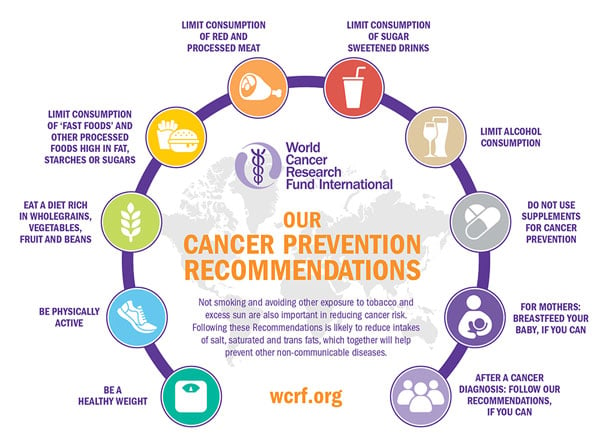Moniek van Zutphen is a PhD candidate at the Division of Human Nutrition and Health at Wageningen University & Research. Her main research question is to assess whether lifestyle patterns after colorectal cancer diagnosis are associated with cancer recurrence, comorbidities and survival.
Many cancer patients are willing to change their diet and lifestyle to prevent their cancer from coming back. World Cancer Research Fund (WCRF) and American Institute for Cancer Research (AICR) recommend cancer survivors follow their Cancer Prevention Recommendations. Following these Recommendations is likely to lower the risk of cancer coming back and is also likely to reduce the risk of other diseases, such as heart disease and type 2 diabetes, which are important causes of ill health in people living beyond cancer.
Although many cancer survivors express their motivation to change their lifestyle, few receive lifestyle advice from a health professional. Therefore, I wondered what lifestyle changes are actually made after a colorectal cancer diagnosis and if people were inclined to change multiple health behaviours. To test this my research team at Wageningen University used the WCRF/AICR Recommendations to assess how overall lifestyle changed.
The WCRF/AICR Score
Last year, scientists developed a standard score to measure adherence to the Recommendations. The 2018 WCRF/AICR score includes specific goals under each Recommendation and so includes weight, physical activity, food and drink. We used this score to assess adherence to the Recommendations, both at diagnosis and two years later, to assess changes in overall lifestyle over time.

The COLON study
To see which lifestyle changes are made after a colorectal cancer diagnosis we used data from the COLON study. The COLON study is an observational study in which more than 2,000 colorectal cancer patients from 12 different hospitals in the Netherlands took part. Shortly after diagnosis, we sent questionnaires to the participants to report on their weight, physical activity, diet, alcohol intake and smoking behavior. The same questionnaires were sent again six months and two years after diagnosis. All participants were diagnosed between 2010 and 2015 and their cancer had not metastasised.
Change in lifestyle
The answers of 1,072 participants showed that 70 per cent of people improved on at least one Recommendation, and people mainly decreased their intake of sugary drinks. Furthermore, they often decreased their intake of red and processed meat.
This was the first study that examined changes in overall lifestyle and, surprisingly, overall lifestyle hardly improved in the first two years after colorectal cancer diagnosis. At first, this seems to be in contrast with the results that 70 per cent of participants improved in at least one aspect of their lifestyle. However, a healthy lifestyle consists of multiple aspects. Half of participants improved adherence with at least one Recommendation but – importantly – worsened adherence with another Recommendation. On average, overall lifestyle did not improve after diagnosis, and no clear pattern was seen for which lifestyle changes were made simultaneously.
It is our hope that health professionals and cancer survivors will be able to discuss lifestyle together. Our research shows that most people do not succeed in improving their lifestyle after cancer on their own, and thus lifestyle support is essential.
The results of this study were published in the Journal of Cancer Survivorship and we gratefully acknowledge the funding received by the Dutch Cancer Society that made this study possible.
> Click here for more information on the research project part funded by WCRF
> If you are a health professional interested in behavior change, our free guide Changing Behaviours can help you start effective conversations with your patients.
